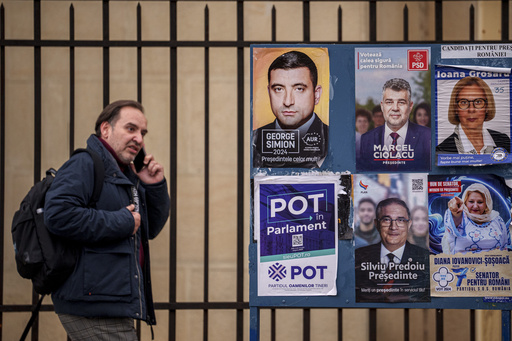
BUCHAREST, Romania — On Sunday, Romanians are participating in the first round of a presidential election that may result in a far-right nationalist contender facing off against the current leftist prime minister in a subsequent runoff.
A total of thirteen candidates are competing for the presidency in the nation, a member of both the European Union and NATO, with expectations for a second round of voting on December 8. Polls opened at 7:00 a.m. local time and will remain open until 9:00 p.m. Voters abroad have been casting their ballots since Friday.
The decisive vote could feature George Simion, who leads the far-right Alliance for the Unity of Romanians (AUR), against the incumbent Prime Minister Marcel Ciolacu, whose campaign is supported by Romania’s largest political party, the Social Democratic Party (PSD).
The presidential position holds a term of five years and comes with substantial authority over crucial areas including national security, foreign relations, and judicial nominations. In addition, Romania is set to conduct parliamentary elections on December 1 that will ultimately decide the next government and prime minister.
Simion, 38, known for his vocal support of U.S. President-elect Donald Trump, has faced controversy over the years. His agenda includes advocating for the reunification of Romania with Moldova, which recently renewed a five-year prohibition on his entry due to security issues. This ban also affects his ability to enter Ukraine.
“I aspire for the next five to ten years for Romanians to take pride in their nationality, to celebrate Romanian culture and products,” he stated to reporters in Bucharest. He emphasized that as president, he would advocate for Romanian interests, which often align with those of the country’s partners.
Cristian Andrei, a political consultant located in Bucharest, noted that the vote could be closely contested, with the diaspora likely playing a decisive part in determining who progresses to the runoff stage.
“We find ourselves at a critical juncture where Romania risks leaning toward a populist regime, given the substantial voter dissatisfaction across various societal segments,” he remarked, highlighting the impact of economic struggles, including a significant budget deficit, high inflation, and an economic downturn, which may drive mainstream candidates towards more populist positions in response to public discontent.
Ciolacu shared his ambitions, stating that a primary objective of his presidency would be to urge Romanians to either stay in the country or return from their respective communities throughout the EU.
“Romania possesses a promising opportunity to evolve into a developed economy within the next decade, where dedication and hard work are justly rewarded, ensuring people enjoy a better quality of life,” he commented. “However, achieving this will require balance and accountability… I am pursuing the presidency as a means for necessary change.”
Other notable candidates include Elena Lasconi from the Save Romania Union party; Mircea Geoana, a former NATO deputy secretary-general running independently; and Nicolae Ciuca, a former army general and head of the center-right National Liberal Party, which currently shares a tense coalition with the PSD.
Geoana, who also served as foreign minister and U.S. ambassador, asserted that his international experience makes him a standout choice among the candidates. “I believe I bring a wealth of competence, experience, and essential connections in this complex world,” he said.
Lasconi, a former journalist leading the USR party, identified corruption as one of Romania’s most pressing issues and advocated for increased defense funding alongside continued support for Ukraine.
Since Russia’s invasion of Ukraine in February 2022, Romania has emerged as a strong ally to the war-torn nation. In contrast, Simion of the AUR party expressed his opposition to Romania providing further military assistance to Ukraine. He expressed hope that Trump could help “end the war.”
The AUR party made a noteworthy leap from relative obscurity in 2020, securing 9% of the parliamentary vote and entering into political representation. Despite denials from Simion regarding claims of extremism leveled against his party, opponents have long raised alarms over the party’s positions.
“We identify ourselves as a Trumpist party within this new wave of patriotic political movements across Europe,” Simion articulated.
